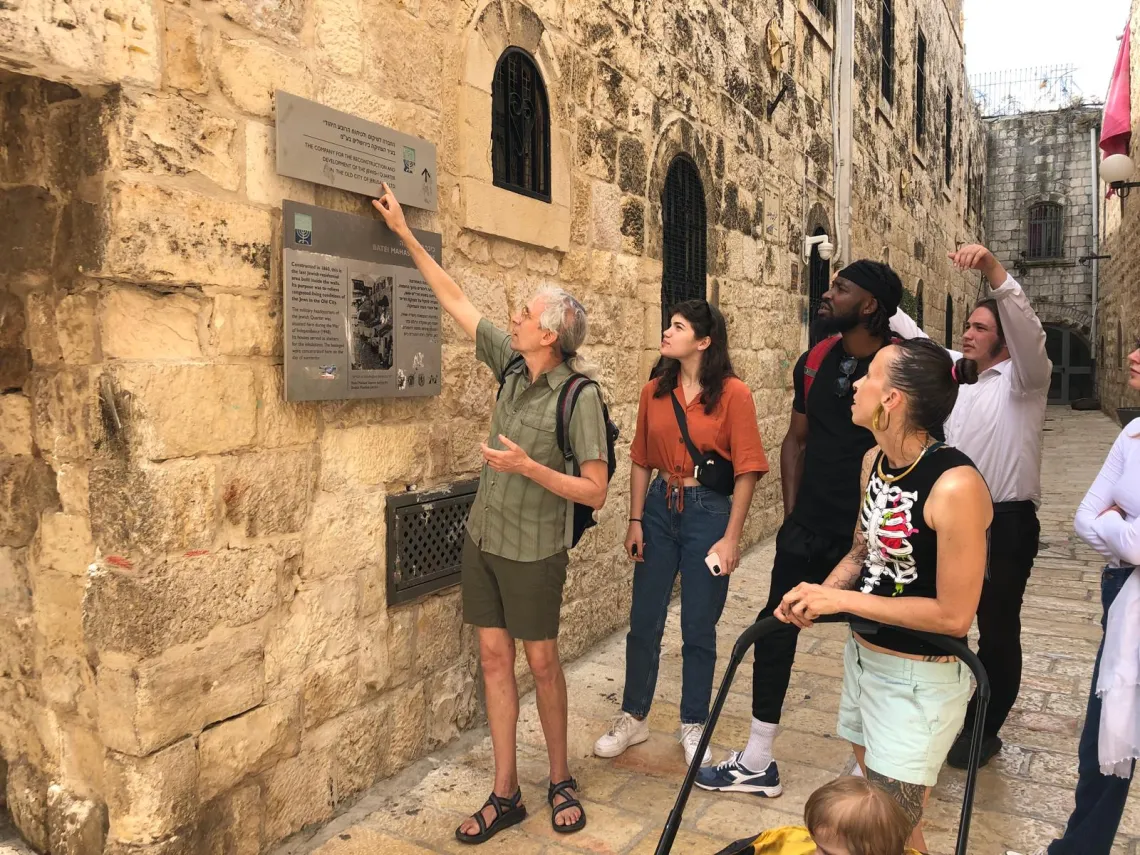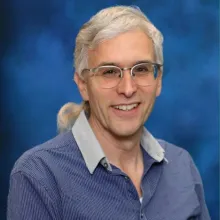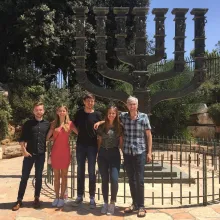Honoring the Past, Shaping the Future: Advancing Holocaust and Human Rights Studies at the University of Arizona

Leonard Hammer with University of Arizona study abroad students outside the Old City of Jerusalem, 2018. Credit: David Graizbord
The Arizona Center for Judaic Studies, or ACJS, established in 2004 at the University of Arizona, has cultivated a strong partnership with Tucson’s vibrant Jewish community. Housed within the School of Global Studies in the College of Social and Behavioral Sciences, the center offers a wide range of courses on Jewish history, religion, culture, and language — including a comprehensive Hebrew language program. Recently, the center announced the creation of a new Eminent Scholars Chair: the Edwin and Alma Lakin Holocaust, Human Rights, and Comparative Genocide Endowed Chair. The Lakin Chair is made possible by a $2 million gift commitment from a lead anonymous donor and additional gifts from Tucson community members. The creation of the endowment is also significantly supported by prominent Tucson-area and U of A philanthropists Paul and Alice Baker.
“I am deeply grateful to the Tucson community members who have funded the Edwin and Alma Lakin Holocaust, Human Rights, and Comparative Genocide Endowed Chair,” said Lori Poloni-Staudinger, dean of the College of Social and Behavioral Studies. “Their vision and generosity will broaden the college’s expertise and outreach on these crucial topics.”
“The Lakin Chair is the result of a long-term partnership between the Arizona Center for Judaic Studies and its friends in Tucson’s Jewish community,” said David Graizbord, director of the center. “We, the faculty and staff of the center, are deeply grateful for the success of this partnership, on which the center’s success depends.”
PRESERVING JEWISH HERITAGE: THE LAKIN CHAIR MISSION
The leading donor of the Lakin Chair grew up with a deep-rooted commitment to preserving Jewish history, instilled by a family devoted to the memory of the Shoah, which is Hebrew for “calamity.” In the 1970s, this dedication led them to an Israeli kibbutz, where they embraced communal values, hard work, and a sense of social responsibility. Upon returning to the U.S., the donor channeled their passion into supporting higher education and aiding individuals with disabilities.
An enthusiastic reader of Jewish history and a regular participant in lectures sponsored by the Arizona Center for Judaic Studies at the Tucson Jewish Community Center, the donor has long supported ACJS and sees the Lakin Chair as a vital investment in both scholarship and quality of life at the university.
The Chair is named for the late Edwin and Alma Lakin — philanthropists and dedicated community supporters who committed themselves to Holocaust education, to the people of Israel, to Jewish life, and to combating antisemitism. They were among the founding supporters of the United States Holocaust Memorial Museum in Washington, D.C., and spearheaded and underwrote the establishment of the Edwin & Alma N. ‘51 Lakin Holocaust Library & Resource Center at Albright College in Reading, Pennsylvania.

Leonard Hammer
The inaugural holder of the Chair is Leonard Hammer, whose education includes a JD from Georgetown University, an LLM in international law from New York University, and a Ph.D. in international human rights from the University of London.
Hammer is a senior lecturer at the Arizona Center for Judaic Studies. He co-founded, helps administer, and teaches in the U of A Human Rights Practice Program. He was also the David and Andrea Stein Visiting Professor of Modern Israel Studies at the ACJS. His research spans international law, human rights, the Middle East, and sacred spaces. In 2022, he received an SBS Teaching Award.
The Lakin Chair will be the platform for a dynamic role: Its holder will be responsible for teaching, conducting research, promoting public educational programming, and inviting scholars to the U of A to generate new scholarship.
“I am honored and grateful to carry on the legacy of Eddie and Alma Lakin, specifically to cultivate the means for proper Holocaust memorialization and education, which will permit and foment insight into future atrocity prevention,” Hammer said.
“I am excited that the Chair includes a comparative genocide component as well as a focus on human rights,” Hammer added. “I have professional contacts in these fields from people around the world who are already eager and interested in taking part in our activities. I envision having experts in Holocaust studies and education in the first round of visiting scholars. As we expand programming, I foresee building out events, especially in the area of memorialization.”
NEW PROGRAMMING WILL EXPAND ENGAGEMENT
One focus of the Lakin Chair will be the yearly convening of an advisory board — comprised of Judaic Studies faculty, faculty from other academic units, non-faculty, and one outside scholar — to choose a yearly and/or triennial theme that will help shape how grants are written, decide on scholarly invitations, and determine what types of academic and public educational content are produced.
“I am looking forward to creating new avenues of engagement between faculty and students, especially with the visiting faculty,” Hammer said. “The structure will afford students broader comparative perspectives than are currently available, and open new vistas for community engagement.
Further, we will play to the strengths of existing ACJS programming, including the U of A Summer in Israel experience.”

Leonard Hammer with University of Arizona study abroad students at the
Knesset Building, Israel, 2018. Credit: David Graizbord
In addition to the Holocaust, the Chair will carefully study topics like reconciliation commissions and the Rohingya human rights crisis in Myanmar.
“Leonard has emphasized that human rights law and its institutional regime, in which he is an expert, emerges directly from the Holocaust,” Graizbord noted.
The chairholder will maintain a strong connection between the Arizona Center for Judaic Studies and Tucson’s Jewish community. Graizbord explains that while regular supporters of the Tucson Jewish Community Center can still expect familiar collaborative lectures, events, and conferences, there will also be new programming. The ACJS will develop that programming in collaboration with, among others, the Tucson Jewish Museum & Holocaust Center with the aim of expanding U of A’s viewing and listening audiences.
“The Chair opens opportunities to offer public lectures and meet with community members in a more personal and intimate setting than in big, public lectures,” Hammer said. “Smaller groups of people allow for richer discourse and deeper discussions.”
Stuart Mellan, retired CEO of the Jewish Federation of Southern Arizona and a long-time community partner of the Arizona Center for Judaic Studies, is enthusiastic about the creation of this endowment and the work it will support.
“It’s been thrilling to see the center grow and thrive through the years,” Mellan said. “This newly expanding area of focus will be incredibly relevant not only in academia but also in the center’s outreach to the community, where it has distinguished itself and made such a powerful impact.”
##
This story was included in the fall 2024 Developments newsletter.

